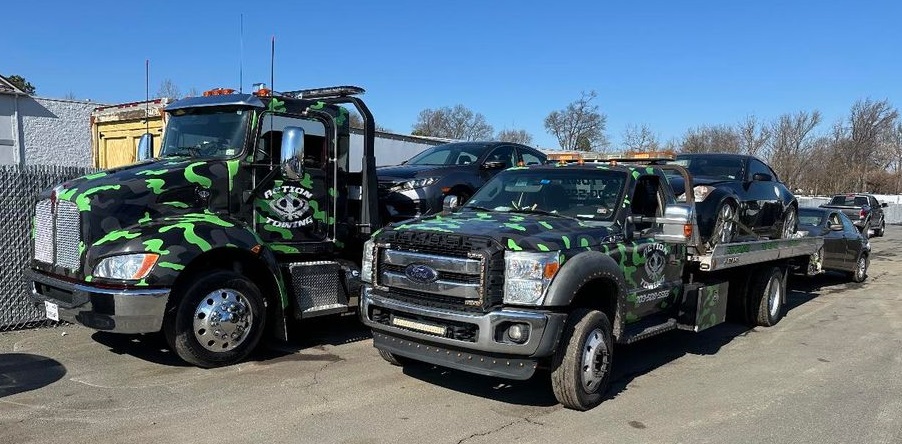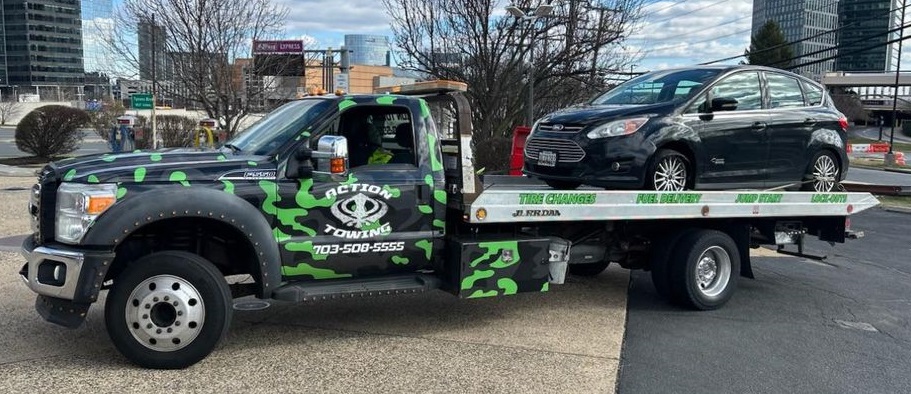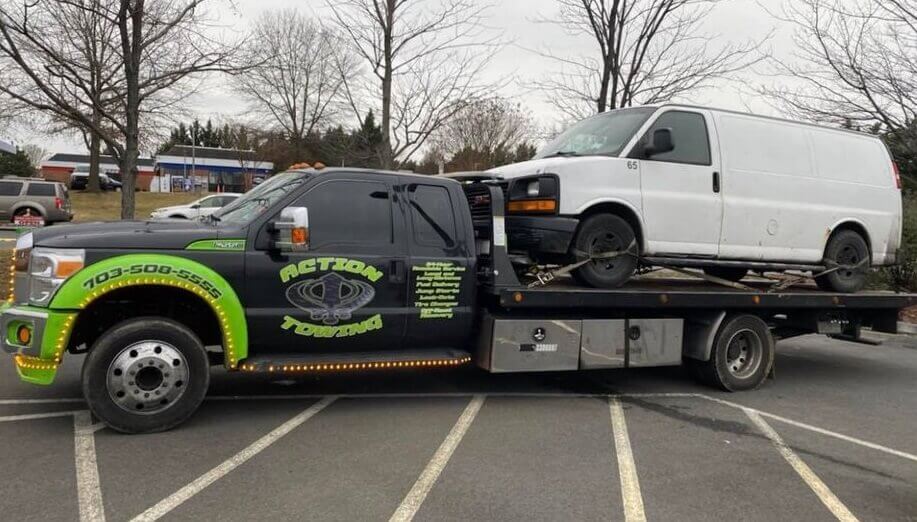 In road safety and emergency response, tow trucks are the unsung heroes that keep the wheels of help and support turning. It’s not about moving illegally parked cars or auctioned vehicles; their critical functions are spotlighted in times of distress, accidents, and natural calamities. This blog will provide a detailed look at the indispensable roles of tow truck services in various emergencies.
In road safety and emergency response, tow trucks are the unsung heroes that keep the wheels of help and support turning. It’s not about moving illegally parked cars or auctioned vehicles; their critical functions are spotlighted in times of distress, accidents, and natural calamities. This blog will provide a detailed look at the indispensable roles of tow truck services in various emergencies.
One comprehensive source that offers relevant data and statistics is the Federal Highway Administration (FHWA). Specifically, the FHWA’s Traffic Incident Management program provides valuable insights into the vital roles of tow truck services during emergencies, accidents, and natural disasters.
Tow trucks are pivotal in responding to various critical situations beyond everyday breakdowns. For instance, during severe weather conditions such as blizzards, hurricanes, and floods, these vehicles are essential in clearing the roads of stranded or damaged cars, facilitating smoother operations for rescue and medical teams.
Additionally, in the unfortunate event of forest fires or industrial accidents, tow trucks assist by relocating vehicles to prevent further damage or to clear pathways for firefighting and rescue operations. These instances underscore the versatility and indispensability of tow trucks in emergency management and recovery efforts.
Further information and statistics on the impact of towing services on emergency response times can be found in the Journal of Emergency Management and the International Association of Traffic and Safety Sciences. It highlights how these services facilitated quicker recovery efforts and the normalization of traffic post-accidents and during natural disasters. This reference underscores the importance of integrating towing operations within the broader framework of emergency response strategies.
Clearing the Roadways
By swiftly removing vehicles and debris from accident scenes, tow truck operators prevent potential secondary accidents, which could result from drivers swerving to avoid obstacles or from reduced visibility. This protects motorists’ lives and ensures emergency vehicles can reach their destinations immediately. Furthermore, during natural disasters, the proactive role of tow trucks in clearing roads allows for quicker access by rescue and medical teams to affected areas, thereby reducing the time to provide critical assistance to those in need. Through these actions, tow truck services play an indispensable role in maintaining public order and safety in times of crisis.
To further understand the critical role of tow truck services in emergency response and safety, the National Traffic and Highway Safety Administration (NHTSA) provides comprehensive reports and guidelines. These documents detail the procedures for incident management and the importance of quick clearance of road accidents and hazards. For example, the NHTSA’s Traffic Incident Management Handbook outlines best practices for emergency responders, including tow truck operators, emphasizing their role in reducing the impact of incidents on traffic flow and enhancing overall road safety. This publication serves as a valuable resource for those interested in the mechanics of roadway incident management and underscores the contributions of tow truck services to public safety.
Facilitating Access for Responders
Tow trucks are the first line of defense in creating a clear path for ambulances, fire trucks, and law enforcement. Their swift actions allow for quicker and more efficient emergency responses.
When accidents occur, it’s critical that emergency responders can reach the scene without delay. Blocked roads can significantly impede this effort, leading to delays in treatment for injured individuals and, in some cases, preventing the swift extinguishment of fires or the containment of hazardous materials. Tow trucks, by rapidly clearing vehicles and debris from the roadway, not only facilitate a smoother flow of traffic but also ensure that life-saving services can access the scenes of accidents without obstruction. This rapid response capability is crucial for minimizing the duration of traffic disruptions and, more importantly, saving lives. Tow truck operators work closely with law enforcement and other emergency services to prioritize incidents based on severity, ensuring that the most critical situations are addressed first.
Testimonials from Emergency Responders
Officer James Keller of the Metropolitan Police Department remarks, “In countless situations, tow truck operators have been the unsung heroes, clearing the way for our team to respond to emergencies swiftly. Their efficiency and dedication directly contribute to saving lives.”
Similarly, Fire Chief Elizabeth Moreno adds, “Quick access to a scene of fire is critical for rescue and firefighting efforts. Tow truck services ensure our trucks can get through, even in the heaviest traffic jams.”
Paramedic Sam Liu shares, “During medical emergencies, every second counts. The work of tow truck operators in clearing accidents and debris from roads often means the difference between life and death for those we’re trying to reach.”
Post-Accident Cleanup
Towing services are instrumental in the cleanup after a vehicular accident. Their task includes carefully removing damaged vehicles and any hazardous materials, which, if left unattended, could pose significant risks to public safety.
In addition to post-accident cleanups, tow truck operators play a pivotal role in managing vehicle-related incidents that impact traffic flow and safety. Collaborating with traffic management centers, they help quickly identify and resolve obstructions on the road. This not only restores the flow of traffic but also prevents the occurrence of secondary accidents caused by sudden stops or swerves. Proactive measures and quick thinking of tow truck services are essential in maintaining road safety and minimizing the impact of vehicular incidents on the broader community.
Providing Emergency Roadside Assistance
 Beyond towing, these services are often the first responders for those stranded on the roadside.
Beyond towing, these services are often the first responders for those stranded on the roadside.
Tow operators are skilled in basic car troubleshooting. A jump start or a minor mechanical fix could be all a stranded driver needs to get back on the road, especially in sub-zero temperatures or during scorching summer heat.
Running out of fuel or experiencing a flat tire can be more than just an inconvenience—it can be dangerous. Towing companies provide these basic but essential services with the same urgency as any other emergency.
The impact of towing services stretches far beyond the simple removal of vehicles from the scene of an incident. These professionals are critical in emergency response efforts, working closely with law enforcement, fire services, and medical teams to ensure public safety and efficient scene management. Through quick action in post-accident cleanup and offering vital roadside assistance, towing services contribute significantly to reducing traffic congestion and minimizing hazards on the road. Their ability to provide instant help during vehicle breakdowns or incidents not only aids in protecting stranded drivers but also supports the overall emergency response system, highlighting their essential role in maintaining road safety and mobility.
Assisting in Car Accidents
Towing services work alongside emergency respondents in the aftermath of severe car accidents. Experienced tow drivers quickly assess the scene, determining the accident’s severity and calling for additional help. In certain situations, tow truck operators are trained to provide first aid or assist in transporting patients when ambulances are delayed or unable to reach the scene promptly.
Training and Certification Requirements
The role of a tow truck operator is technical and demands a specific skill set for the safety and efficiency of operations. Many states require tow truck drivers to obtain special licenses and undergo rigorous training programs to ensure professionalism and competence. These programs cover a wide range of topics, including the operation of towing equipment, safety procedures, basic mechanical knowledge, and emergency response skills. Furthermore, certification from recognized organizations such as the Towing and Recovery Association of America (TRAA) can be crucial. This certification validates a driver’s expertise and assures customers and emergency response teams of the driver’s reliability and adherence to industry standards. Continuous education is also encouraged within the industry to keep up with new technologies and safety protocols, highlighting the commitment to excellence and safety in towing services.
The comprehensive training process for tow truck operators is a critical aspect of their profession, ensuring they can safely and effectively perform their duties. This training combines classroom instruction with hands-on experience, covering various topics such as mechanical knowledge, safety protocols, and customer service.
Operators learn how to handle different types of towing equipment and vehicles, including the proper use of hooks and chains, winching techniques, and the operation of flatbeds and wheel-lift tow trucks. Safety training is paramount, emphasizing the importance of securing loads correctly, navigating traffic, and working in hazardous conditions. Furthermore, operators receive guidance on communication skills and roadside assistance etiquette to provide supportive and efficient service to motorists in distress. This extensive training ensures that tow truck operators are well-equipped to manage various roadside emergencies, contributing to their professionalism and the community’s safety.
Responding to Natural Disasters
When nature strikes, tow trucks are instrumental in the safety and recovery of the affected areas.
During natural disasters such as floods, hurricanes, and earthquakes, roads can become impassable, vehicles can be stranded or damaged, and critical infrastructure can be blocked by debris. Tow truck operators are often among the first responders, working closely with emergency services to clear pathways, rescue stranded motorists, and recover vehicles obstructing emergency and recovery efforts.
Their rapid response and specialized equipment allow for the swift removal of obstructions, facilitating the efforts of rescue teams and emergency vehicles to reach affected areas without delay. This service is vital for the immediate aftermath of the disaster. It plays a crucial role in the longer-term recovery process, helping restore normalcy to communities and ensuring that roads and transport networks are safe for use.
Towing services help clear parking spaces and roadways to facilitate the evacuation of areas prone to natural disasters, ensuring a faster and safer relocation of affected citizens. Post-disaster cleanup is a monumental task. Tow trucks are called upon to help clear roads, bridges, and public pathways, significantly restoring normalcy.
Supporting Emergency Services
In the wake of natural disasters, tow truck operators often work closely with emergency services to provide critical support. Their role extends beyond vehicle recovery, assisting in transporting essential supplies and machinery and sometimes even aiding in rescue operations. This collaborative effort is vital in ensuring emergency personnel have the access and resources to carry out their duties effectively. Tow truck operators become unsung heroes, braving hazardous conditions to support their communities in need. Their dedication underscores the importance of towing services in daily operations and emergency response scenarios.
Environmental Impact
While often overshadowed by the immediate benefits they provide in emergencies and recovery efforts, the environmental footprint of towing services raises significant considerations. The operation of tow trucks, particularly in large-scale responses to natural disasters, contributes to carbon emissions and fuel consumption. However, the industry is taking steps towards sustainability by adopting more fuel-efficient vehicles and exploring alternatives such as electric tow trucks. Additionally, responsible practices in managing and disposing of vehicular fluids and parts during the cleanup process help mitigate adverse environmental impacts. These efforts are crucial in balancing the indispensable role of towing services with ecological stewardship.
For more information on the towing industry’s environmental initiatives and sustainable practices, refer to the “Green Towing” initiative by the Towing and Recovery Association of America (TRAA). This program outlines the industry’s efforts to reduce carbon emissions, promote fuel efficiency, and implement eco-friendly cleanup procedures. Visit their official website at TRAA for detailed resources and guidelines on sustainable towing operations.
Transporting Vehicles to Safety
 During calamities like floods, where vehicles can be immobilized, tow truck services are key in transportation to higher ground. In flood-prone areas, tow operators tirelessly remove vehicles from low-lying areas, preventing flood damage and aiding property preservation. Towing companies move vehicles to safety and ensure they are secured in designated areas, preventing theft or further damage during challenging times.
During calamities like floods, where vehicles can be immobilized, tow truck services are key in transportation to higher ground. In flood-prone areas, tow operators tirelessly remove vehicles from low-lying areas, preventing flood damage and aiding property preservation. Towing companies move vehicles to safety and ensure they are secured in designated areas, preventing theft or further damage during challenging times.
For further reading on the environmental implications of tow truck operations and the automotive industry’s sustainability efforts, the Environmental Protection Agency (EPA) offers comprehensive resources. The EPA’s guidelines and studies on reducing greenhouse gas emissions from transportation provide insights into how towing services can adopt more eco-friendly practices. To explore these environmental standards and recommendations, visit the EPA’s official website. In particular, the EPA provides excellent data and information regarding emergency response, laws, and regulations.
The community impact of towing services extends beyond mere vehicle recovery and roadside assistance; it plays a pivotal role in ensuring public safety and order. By swiftly clearing vehicles involved in accidents or breakdowns, tow trucks help maintain a smooth traffic flow, reducing the risk of further incidents. Their operations also support local law enforcement in removing illegally parked or abandoned vehicles, enhancing urban cleanliness and space utilization. Furthermore, towing companies often collaborate with emergency response teams in the aftermath of disasters, contributing to community resilience by aiding in rapid recovery efforts. Their presence reassures residents, knowing that help is readily available during critical times, reinforcing a sense of community solidarity and support.
Providing Support to Emergency Responders
In large-scale emergencies, tow trucks act as a support to provide auxiliary help to emergency responders. Tow trucks offer the mobility and accessibility required to transport crucial equipment and rescue personnel to affected areas where conventional vehicles may not be viable. During mass evacuations or road closures, tow truck operators often double as traffic controllers, ensuring safe passage for citizens and emergency vehicles.
For those interested in learning more about how tow truck drivers are integrated into emergency response efforts and the specialized training they receive to work effectively alongside other emergency responders, the National Highway Institute (NHI) offers resources and courses designed specifically for this purpose. Emergency Responder Training for Tow Truck Drivers provides foundational and advanced skills necessary for tow truck operators to safely and efficiently manage roadside emergencies and support broader emergency response strategies. This initiative underscores the critical role of tow truck drivers in maintaining public safety and highlights the collaborative effort required among all emergency services.
Expert Handling of Special Vehicles
In high-value or hazardous cargo emergencies, tow truck companies with specialized units can provide the necessary expertise for safe transport. From tankers to high-end luxury cars, specialized tow trucks are equipped to handle various unique situations and cargo, such as securing containment after tanker spills or safe recovery during heist situations. Towing companies are trained to contain and clean up hazardous materials that may spill during transportation, ensuring minimal environmental impact and public health and safety.
To further illustrate the importance of specialized training for tow truck operators, particularly in handling high-value or hazardous cargo, the Occupational Safety and Health Administration (OSHA) provides comprehensive guidelines. These guidelines detail best practices for safely managing loads and reducing risks associated with transportation incidents. OSHA’s recommendations are a foundational reference for towing companies striving for excellence in safety and efficiency during operations, highlighting the critical nature of specialized training in ensuring public and environmental protection.
Conclusion
The breadth of responsibilities undertaken by tow trucks in emergencies goes beyond the conventional understanding of their role. Their agility, preparedness, and commitment to public safety make them indispensable road assets. It remains a testament to their service that towing companies continue to evolve, offering comprehensive training and resources to their operators, ensuring they can provide the highest level of assistance in any crisis.
Tow trucks are not just a business on wheels; they are a lifeline when the unexpected occurs. Whether a flat tire or a natural disaster, these services ensure reliability and safety in the most critical moments. And for the highways that connect us, that thread could mean the difference between chaos and peace.
The economic impact of tow truck operations extends well beyond the immediate revenue of towing services. Efficient and effective towing services minimize traffic congestion, particularly following accidents or breakdowns on major thoroughfares. This congestion reduction saves countless hours that would otherwise be lost to traffic delays and contributes to decreased vehicle emissions, promoting a healthier environment. Furthermore, by swiftly clearing vehicles from accident scenes, tow trucks help reduce secondary accidents, potentially saving economies millions in healthcare and legal costs associated with road traffic accidents. Tow truck companies, by investing in advanced training and technologies, not only enhance their service delivery but also stimulate economic activity by contributing to the safety and efficiency of the transportation infrastructure.

Thank you for explaining that towing services can help with jump-starting your battery. We just moved and have been thinking about finding some numbers locally to call in case of emergencies. I wasn’t aware of all of the different services towing companies could provide, so I’ll have to share this with my husband so we can look for a company to work with.
Thank you for mentioning that towing services play a critical role in assisting in the event of a car accident since they help tow damaged vehicles to a repair shop and ensure those involved are safely out of harm’s way. I heard an accident just happened on the street across because of two cars colliding suddenly. I hope they called urgent towing services to help with the accident right away.